Are you a Singaporean resident looking for information on how to pay your income tax? If so, you’re in the right place! In this article, we’ll guide you through paying your income tax in Singapore.
We’ll cover everything from the basics of personal finance to the nitty-gritty details of filing your income tax return.
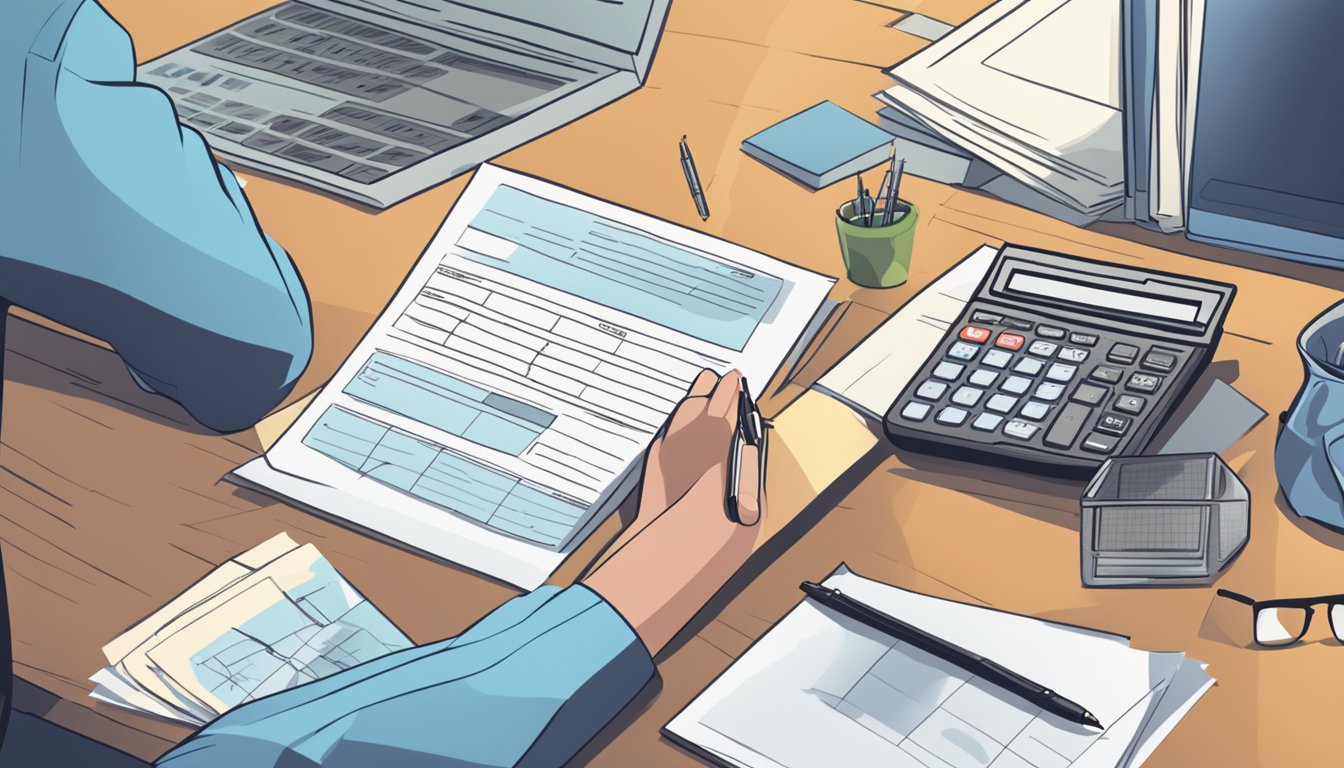
Paying your income tax in Singapore is essential to managing your finances. As a resident of Singapore, you are required to pay taxes if you earn a gross income of S$22,000 or more in a year.
Failing to pay your taxes can result in hefty fines and legal trouble, so staying on top of your tax obligations is essential. But don’t worry – paying your taxes doesn’t have to be a daunting task. With the correct information and resources, you can easily file your income tax return and comply with Singapore’s tax laws.
In this article, we’ll walk you through paying your income tax in Singapore. We’ll cover everything from calculating your net income to choosing the correct filing method for your needs.
Whether you’re a first-time taxpayer or a seasoned pro, this guide will help you navigate the world of personal finance and income tax in Singapore. So let’s get started!
1-Minute Read: Settling Your Singapore Income Tax Smoothly
Even superheroes need to pay taxes! But fear not, Singaporean citizen, for filing and paying your income tax needn’t be a battle. This quick guide equips you with the essential need to know for a smooth tax season.
The Nuts & Bolts:
- Filing: The fun starts between early March and mid-April (electronic filing) or by April 15th (paper).
- Eligibility: If you’re a tax resident with a yearly income exceeding S$22,000, you must file.
- Payment: Once assessed, you can settle your dues via GIRO (one-time or instalments), electronic payments (AXS, online banking, etc.), or at post offices using NETS.
Are you feeling overwhelmed? Don’t sweat it!
A wealth of resources is available from the Inland Revenue Authority of Singapore (IRAS) to help you navigate the process. From handy online guides to tax calculators, IRAS is your one-stop shop for a stress-free tax season.
So, what are you waiting for? Dive into the IRAS website and unlock a world of tax tips and tricks you might not have known below! Trust us, it could mean significant savings and a lighter tax burden.
Understanding Income Tax in Singapore

If you are a Singapore resident, you must pay income tax on your income earned in Singapore and overseas. In this section, we will help you understand what income tax is and the role of IRAS in Singapore’s tax system.
What Is Income Tax?
Income tax is a tax on your income earned in a given year. It is a legal obligation for all individuals who earn income in Singapore to pay personal income tax. The income tax rates in Singapore are progressive, meaning that the more you earn, the higher your tax rate will be. The tax rates for residents range from 0% to 22%, while non-residents face a flat rate of 15% to 22% [1].
The Role of IRAS
The Inland Revenue Authority of Singapore (IRAS) is the main tax authority in Singapore. IRAS is responsible for assessing, collecting, and enforcing taxes in Singapore. IRAS also provides guidance and support to taxpayers to help them understand their tax obligations and file their tax returns correctly.
When you file your tax return, IRAS will assess your income and tax payable. After assessment, IRAS will issue a Notice of Assessment (NOA) outlining the amount of tax you must pay or the refund you are entitled to. You can log in to myTax Portal to view your tax bill and make payments [2].
In conclusion, understanding income tax in Singapore is crucial for all individuals who earn income in Singapore. IRAS plays a vital role in Singapore’s tax system, and it is essential to comply with their guidelines to avoid penalties.
Registration and E-Filing Requirements
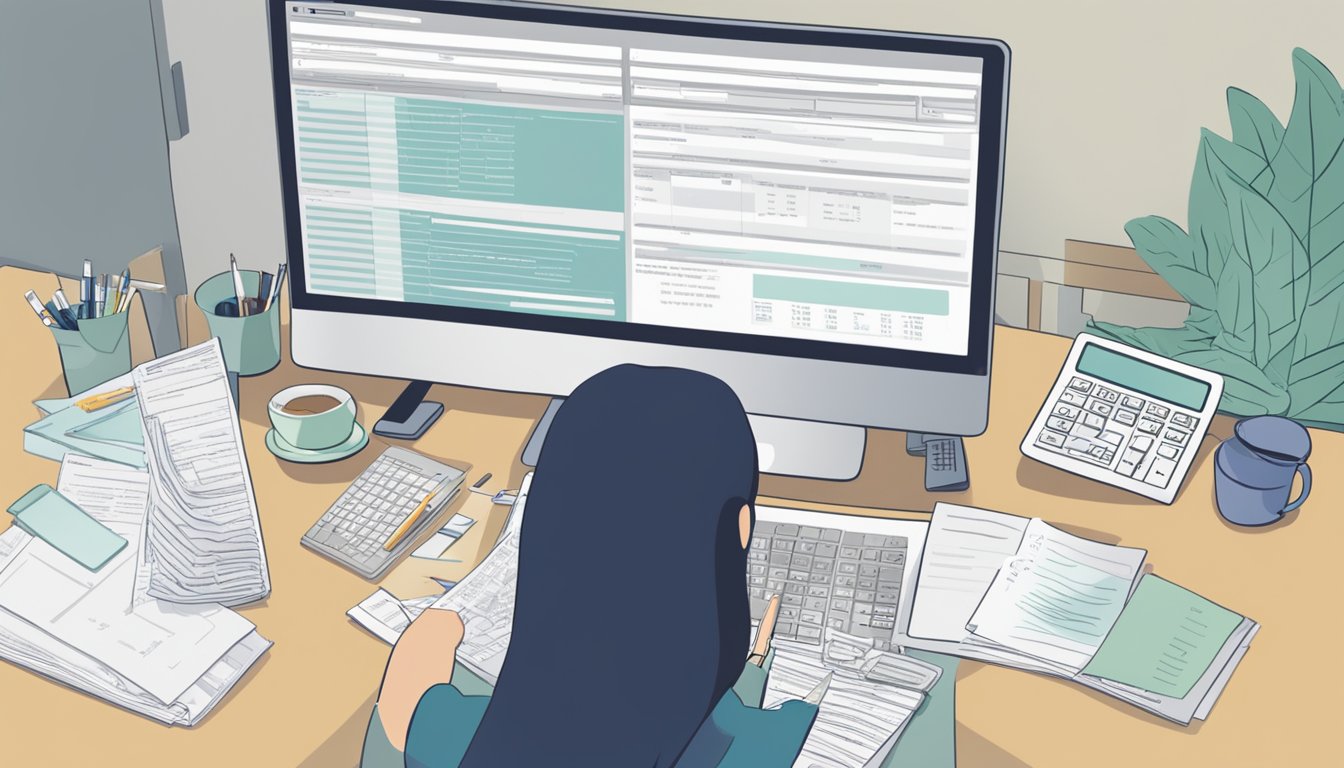
Are you a resident of Singapore who is required to file income tax returns? If so, you can do so conveniently using the IRAS e-filing system. Here’s what you need to know to get started:
Getting Started with SingPass
Before you can e-file your income tax returns, register for a SingPass account. SingPass is a secure online portal that allows you to access various government services, including the IRAS e-filing system. You can register for a SingPass account online or at any SingPost branch. Once you have your SingPass account, you can log in to the IRAS e-filing system and start filing your income tax returns.
Navigating MyTax Portal
The IRAS MyTax Portal is a user-friendly platform that allows you to manage your tax affairs online. When you log in to MyTax Portal, you can access your tax account and view your tax notices, payment history, and other tax-related information. You can also use MyTax Portal to e-file your income tax returns, submit your tax forms, and make tax payments.
To access MyTax Portal, you need to log in using your SingPass account. Once logged in, you can navigate the portal using the menu bar at the top of the page. From there, you can access the various features and tools available on the portal.
Auto-Inclusion Scheme for Employers
If you’re an employee, your employer may participate in the Auto-Inclusion Scheme (AIS), which automatically includes your employment income in your tax return. You don’t have to manually enter your income details when e-filing your tax returns. Instead, your employer will submit your income details to IRAS, and the information will be automatically populated in your tax return.
To check whether your employer participates in the AIS, log in to MyTax Portal and check your tax return status. If your employer participates in the scheme, you’ll see a message indicating that your employment income has been included in your tax return.
E-Filing and IRAS Unique Account
When e-filing your income tax returns, you must use your SingPass account to log in to the IRAS e-filing system. Once you’re logged in, you’ll be prompted to create an IRAS Unique Account, a separate account allowing you to submit your tax returns and access other tax-related services.
When you submit your tax returns, you’ll receive an acknowledgement page confirming that your tax returns have been successfully submitted. You can also log in to MyTax Portal to check the status of your tax returns and view your tax notices.
In summary, e-filing your income tax returns in Singapore is simple and convenient. Registering for a SingPass account, navigating the MyTax Portal, and participating in the AIS allows you to easily manage your tax affairs and stay on top of your tax obligations.
Income Tax Calculations

Paying income tax can be confusing, but understanding the calculations behind it can help you make sense of it all. Here are the key things you need to know about calculating your personal income tax rates in Singapore.
Assessing Taxable Income
Your taxable income is the amount of money you earn subject to taxation. This includes your salary, bonuses, and any other income you receive. However, certain types of income may be exempt from taxation, such as income from certain investments or rental properties.
To calculate your taxable income, you first need to determine your assessable income. This is your total income minus any allowable expenses and deductions. Once you have your assessable income, you can then apply any applicable tax reliefs and deductions to arrive at your taxable income.
Understanding Tax Reliefs
Tax reliefs are deductions that can be applied to your assessable income to reduce your taxable income. Many different types of tax reliefs are available in Singapore, including those for charitable donations, medical expenses, and education expenses.
It’s important to note that tax reliefs are subject to certain conditions and limits, so it’s essential to check the IRAS website for the latest information on available tax reliefs and how to claim them.
Calculating Personal Income Tax Rates
Once you have your taxable income, you can calculate your personal income tax rates. Singapore has a progressive tax system, which means that the more you earn, the higher your tax rate will be.
The current personal income tax rates in Singapore are as follows:
| Taxable Income | Tax Rate |
|---|---|
| First $20,000 | 0% |
| Next $10,000 | 2% |
| Next $10,000 | 3.5% |
| Next $40,000 | 7% |
| Next $40,000 | 11.5% |
| Next $40,000 | 15% |
| Next $40,000 | 18% |
| Next $40,000 | 19% |
| Above $320,000 | 22% |
To calculate your personal income tax liability, you can use the Singapore Income Tax Calculator provided by MoreBetter Singapore. This calculator takes into account your taxable income, tax reliefs, and deductions to give an estimate of your personal income tax liability.
By understanding how your taxable income is assessed, what tax reliefs are available, and how personal income tax rates are calculated, you can better manage your personal finances and make informed decisions about your tax obligations.
Payment Methods for Income Tax
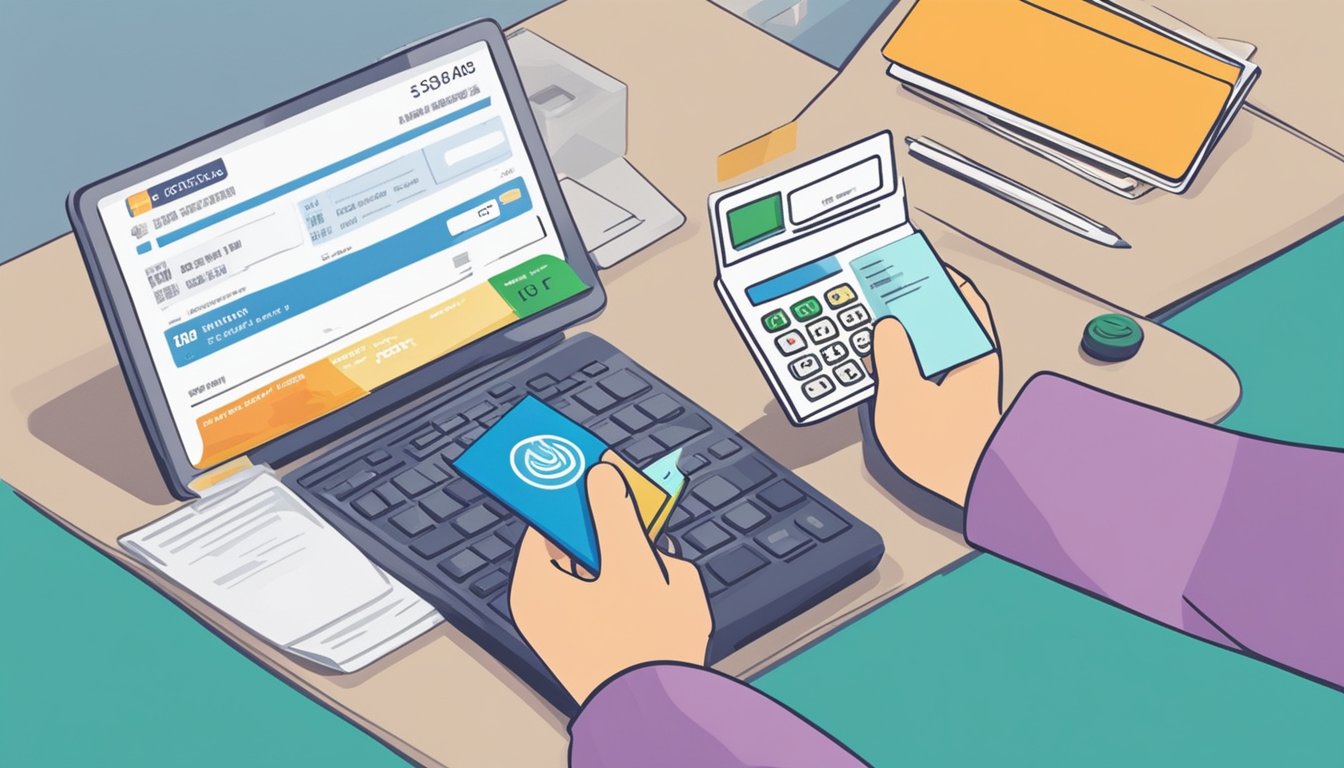
Paying income tax in Singapore is easy and convenient, and various payment methods are available. You can choose from various payment modes, such as GIRO arrangements and alternative payment modes.
GIRO Arrangements
GIRO arrangements are a popular payment mode for income tax in Singapore. With GIRO, you can authorize IRAS to deduct the tax amount directly from your bank account on the due date. This ensures timely payment and avoids any late payment penalties.
You can easily set up a GIRO arrangement by completing the GIRO application form on the IRAS website.
Alternative Payment Modes
Apart from GIRO arrangements, several alternative payment modes are available for income tax in Singapore. These include electronic payment modes such as PayNow, ATM, and NETS. You can also make payments through the AXS e-station, AXS m-station, and SAM payment network.
You can use the IRAS website or the AXS e-station if you prefer to pay by credit card. However, please note that credit card payments will be charged a fee.
In addition, phone banking is another convenient way to pay your income tax in Singapore. You can use your phone to make payments through the various banks’ phone banking services.
Overall, many payment modes are available for income tax in Singapore, making it easy and convenient for you to pay your taxes on time.
Tip: Consider Tax Instalments
Opt for GIRO instalments to spread out your tax payments over 12 months. This approach makes tax season less financially overwhelming.
Break down your tax bill into manageable monthly chunks – GIRO instalments put you in control of your tax payments throughout the year.
Important Dates and Deadlines
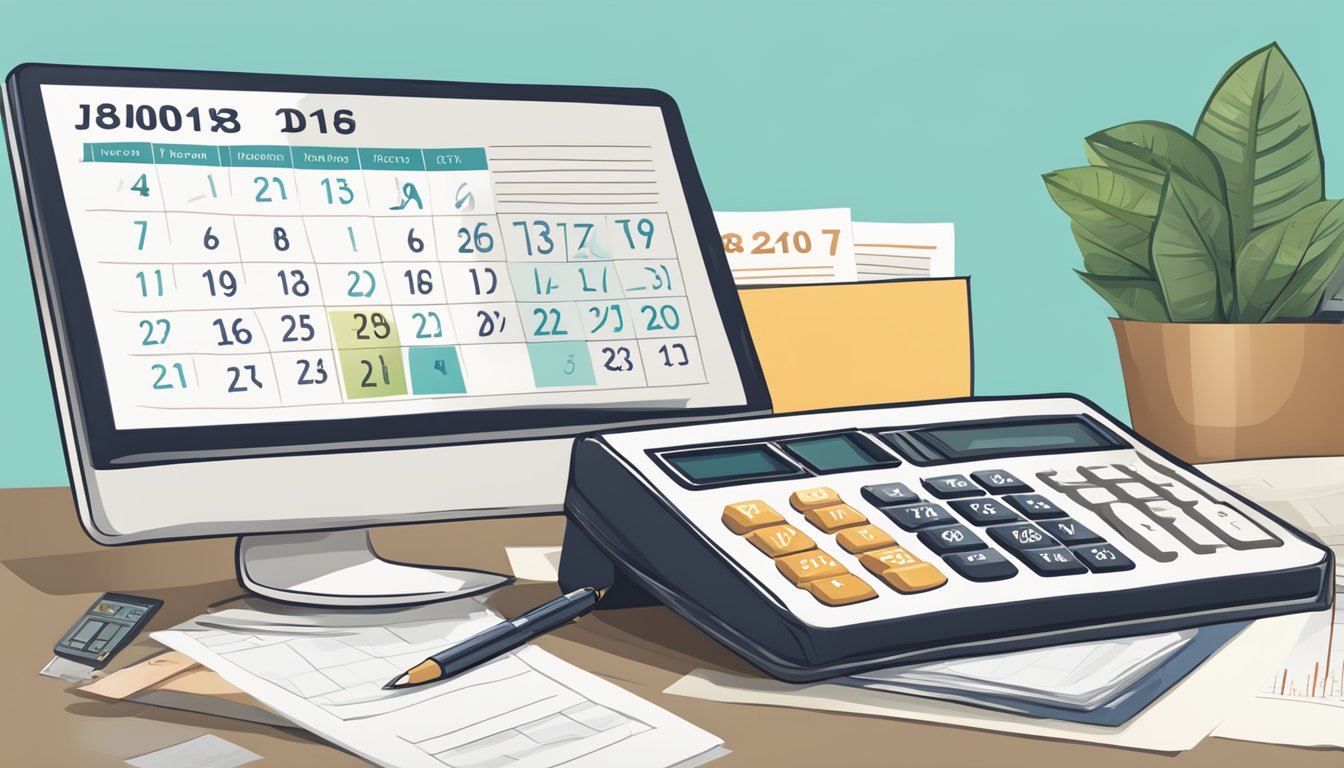
If you are an individual earning income in Singapore, it is important to keep track of the important dates and deadlines related to income tax filing and payment. Here are the key dates to keep in mind:
Income Tax Filing Deadline
The deadline for filing your income tax return for the Year of Assessment (YA) 2024 is April 18th 2024. However, you are encouraged to file your taxes earlier if possible to avoid any last-minute rush.
Payment Due Dates
If you are required to pay income tax, you must make payment by the following due dates:
| Type of Tax | Due Date |
|---|---|
| Advance Tax | 15 Sep 2023 |
| Estimated Chargeable Income (ECI) | September 15th 2023 |
| Final Income Tax | November 30th 2023 |
It is important to note that the above due dates are for YA 2024. If you are unsure about your tax obligations or have any questions, you can refer to the IRAS website for more information.
To avoid any penalties or interest charges, it is important to make sure that you pay your taxes on time. You can make your payment online through the IRAS website. Alternatively, you can also make payment through AXS stations or at any Singapore Post branch.
In conclusion, it is important to keep track of the important dates and deadlines related to income tax filing and payment in Singapore. By doing so, you can avoid any penalties or interest charges and ensure that you are in compliance with the law.
Tax Considerations for Different Incomes
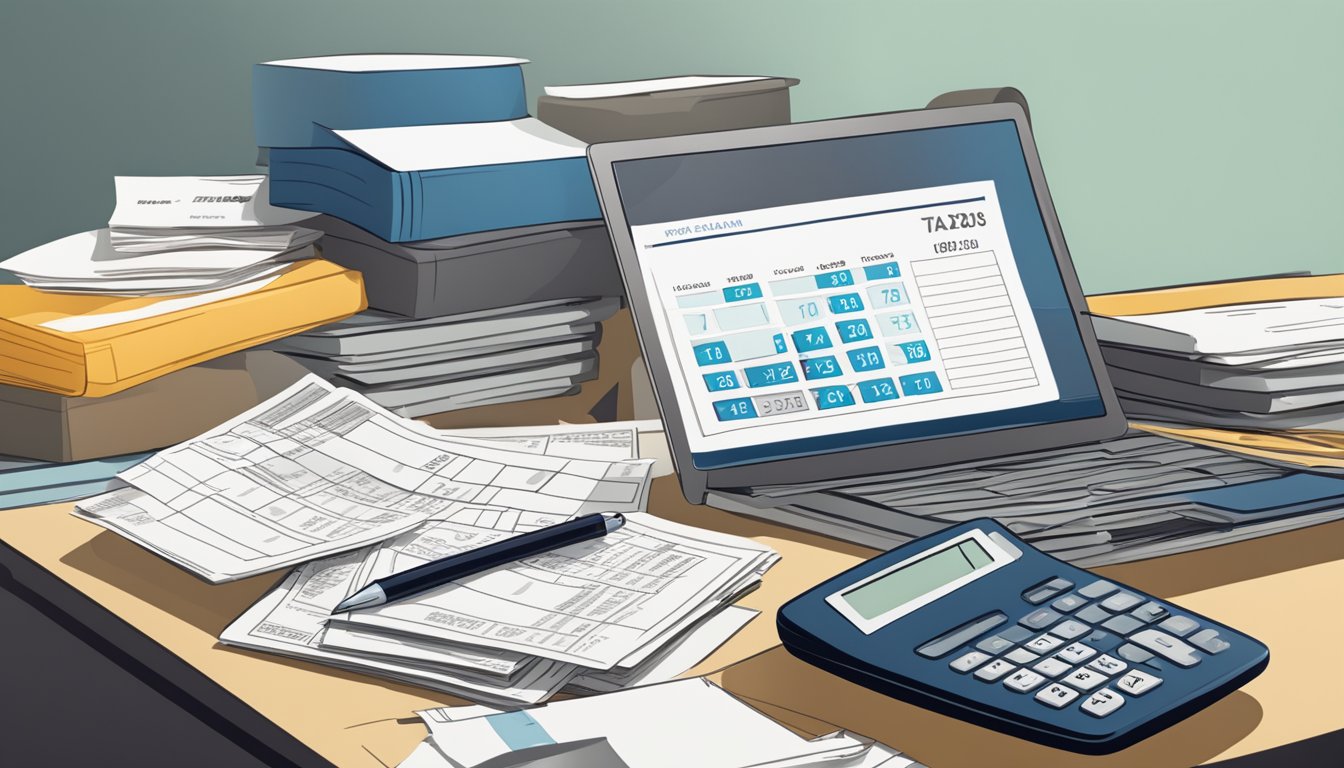
If you are earning income in Singapore, you will need to pay personal income tax. The tax rate is progressive, meaning that the more you earn, the higher the tax rate you will have to pay. In this section, we will discuss the tax considerations for different types of incomes.
Employment and Salary
If you are an employee, your employer will deduct the tax from your salary and pay it to the Inland Revenue Authority of Singapore (IRAS) on your behalf. You will receive a tax statement from your employer at the end of the year, which will show the amount of tax deducted from your salary. If you have additional income, such as rental income or investment income, you will need to declare it to IRAS and pay the tax separately.
Business and Trade
If you are running a business or engaged in trade, you will need to pay tax on your profits. You will need to file a tax return with IRAS and pay the tax by the due date. You may also be eligible for certain tax deductions and allowances, such as capital allowances and expenses incurred in the course of your business.
Investment and Other Incomes
If you have investment income, such as dividends or interest, you will need to declare it to IRAS and pay tax on it. If you have rental income, you will need to declare it and pay tax on it as well. If you are earning income from gig work, you will need to declare it and pay tax on it too. If you are a foreigner working in Singapore, you will need to pay tax on your Singapore-sourced income.
Self-Employed and Partnership
If you are self-employed, you will need to report your income and expenses to IRAS and pay tax on your net income. If you are in a partnership, each partner will need to report their share of the partnership income to IRAS and pay tax on it separately.
In conclusion, regardless of the type of income you earn, it is important to understand your tax obligations and pay your taxes on time. By doing so, you can avoid penalties and interest charges and ensure that you are compliant with the tax laws in Singapore.
Relief and Deduction Schemes

When it comes to paying income tax in Singapore, there are various relief and deduction schemes available that can help you reduce your tax bill. Here are some of the most popular schemes that you can take advantage of.
CPF Contributions and SRS
One of the easiest ways to reduce your tax bill is by making contributions to your CPF account or Supplementary Retirement Scheme (SRS). Both of these schemes offer tax relief, which means that the amount you contribute is deducted from your taxable income. For example, if your taxable income is $50,000 and you contribute $5,000 to your SRS account, your taxable income will be reduced to $45,000. This will result in a lower tax bill.
Course Fees and NSman Reliefs
If you’re taking courses to upgrade your skills or further your education, you may be eligible for course fees relief. This relief allows you to claim up to $5,500 in tax relief for the course fees you paid. Similarly, if you’re a National Serviceman (NSman), you may be eligible for NSman relief. This relief allows you to claim up to $3,000 in tax relief for your NSman contributions.
Family and Parent Reliefs
If you have children or are supporting your parents, you may be eligible for family and parent reliefs. These reliefs allow you to claim tax relief for expenses related to your children or parents. For example, you can claim up to $4,000 in tax relief for each child under the age of 16. You can also claim up to $9,000 in tax relief if you’re supporting your parents.
Overall, there are many relief and deduction schemes available that can help you reduce your tax bill in Singapore. By taking advantage of these schemes, you can keep more of your hard-earned money in your pocket.
Special Tax Considerations

If you are a foreigner or non-resident earning income in Singapore, there are special tax considerations you need to be aware of. In this section, we will discuss two important topics related to personal income tax in Singapore: Non-Residents and Foreign Income, and Tax Exemptions and Rebates.
Non-Residents and Foreign Income
If you are a non-resident and earn income in Singapore, you may be subject to withholding tax. Withholding tax is a tax on income earned in Singapore that is paid to non-residents. The withholding tax rate for non-residents is generally 15% of the gross amount of the payment, but it can be reduced under certain tax treaties.
Non-residents are also subject to non-resident tax rates on their Singapore-sourced income. The non-resident tax rates are higher than the tax rates for residents, ranging from 15% to 22%. However, non-residents are not subject to tax on their foreign-sourced income, unless it is received in Singapore through a partnership in Singapore.
Tax Exemptions and Rebates
There are several tax exemptions and rebates available to individuals in Singapore. For example, you may be exempted from paying tax on your income if it is below a certain amount. In addition, there are tax rebates available for certain groups of individuals, such as older taxpayers and those with children.
To determine your tax residency status and eligibility for tax exemptions and rebates, you should refer to the Inland Revenue Authority of Singapore (IRAS) website. The IRAS website provides detailed information on the various tax exemptions and rebates available to individuals in Singapore.
In conclusion, as a foreigner or non-resident earning income in Singapore, it is important to be aware of the special tax considerations that apply to you. By understanding the tax rules and regulations, you can ensure that you comply with the law and take advantage of any tax exemptions and rebates that you may be eligible for.
Dealing with Tax Notices
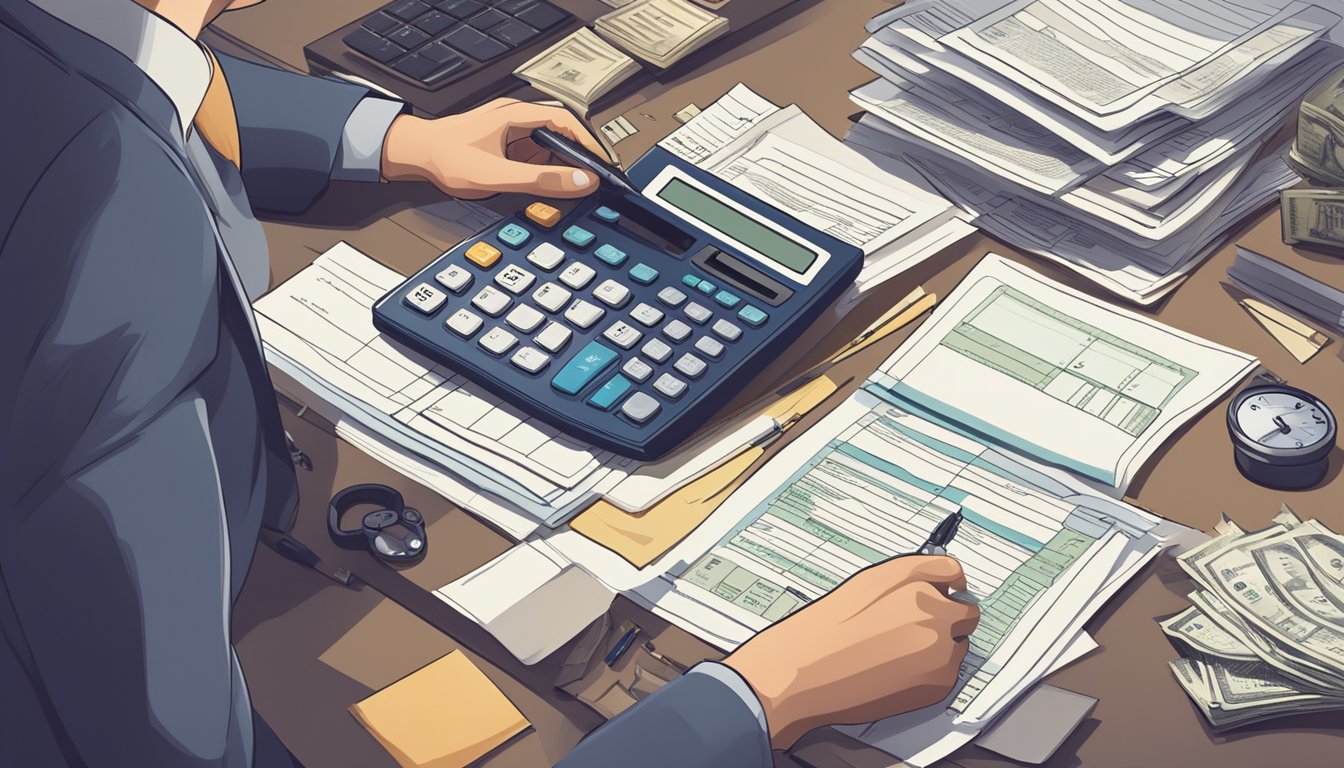
If you have filed your income tax returns, you will receive a Notice of Assessment (NOA) from the Inland Revenue Authority of Singapore (IRAS). This notice will inform you of the amount of tax you need to pay or the amount of refund you will receive. Here’s what you need to know about dealing with tax notices in Singapore.
Understanding the Notice of Assessment
The NOA is an important document that you should read carefully. It contains information about your income, deductions, relief claims, and the amount of tax payable. If you have any questions or discrepancies, you should contact IRAS immediately. You can also log in to the myTax Portal to view your NOA and check your tax account balance.
Resolving Discrepancies and Penalties
If you find any discrepancies in your NOA, you should inform IRAS as soon as possible. You can do this by logging in to the myTax Portal and submitting an e-Service request. If you fail to pay your taxes on time, you may be subject to penalties and interest charges. To avoid penalties, make sure you pay your taxes on time and in full.
If you are unable to pay your taxes on time, you can apply for an instalment plan. This will allow you to pay your taxes in monthly instalments over a period of up to 12 months. However, you will need to pay a late payment penalty of 5% of the outstanding tax amount.
In conclusion, dealing with tax notices in Singapore can be a straightforward process if you understand the NOA and know how to resolve any discrepancies or penalties. Make sure you read your NOA carefully, check your tax account balance regularly, and contact IRAS if you have any questions or concerns.
Tax Planning for the Future

Planning for your future financial goals is an important aspect of personal finance. One of the key areas to consider is tax planning. By taking steps to reduce your tax liability, you can increase your savings and achieve your financial goals faster.
Life Insurance and Long-Term Savings
Life insurance is not just a tool for providing financial security to your loved ones in the event of your death. It can also be used for tax planning. In Singapore, premiums paid for life insurance policies are eligible for tax relief under the Life Insurance Relief scheme. This can help to reduce your taxable income and lower your tax bill.
Another way to save for the future and reduce your tax liability is through long-term savings plans such as unit trusts. These investment vehicles offer tax benefits such as tax exemption on dividends and capital gains. By investing in unit trusts, you can grow your wealth while also reducing your tax liability.
Estate Planning and Tax Implications
Estate planning is another important area to consider when it comes to tax planning. In Singapore, estate duty is levied on the net value of a deceased person’s assets. By planning ahead and taking steps to minimise your estate duty liability, you can ensure that more of your assets are passed on to your loved ones.
One way to reduce your estate duty liability is to make gifts to your loved ones during your lifetime. In Singapore, gifts made more than five years before your death are not subject to estate duty. This can be a tax-efficient way to transfer your wealth to the next generation.
It is also important to consider the tax implications of any assets you inherit. In Singapore, inherited assets are generally not subject to income tax or capital gains tax. However, if you sell an inherited asset, you may be liable for capital gains tax. By understanding the tax implications of inherited assets, you can make informed decisions about how to manage your wealth.
Conclusion
Tax planning is an important aspect of personal finance. By taking steps to reduce your tax liability, you can increase your savings and achieve your financial goals faster. Life insurance, long-term savings plans, estate planning, and tax-efficient investing are all tools that can help you to minimise your tax bill and maximise your wealth. With careful planning and the right advice, you can build a secure financial future for yourself and your loved ones.
Frequently Asked Questions
What are the steps to pay my income tax online in Singapore?
Paying your income tax online in Singapore is a straightforward process. You can do this by logging into the IRAS website and following the prompts to pay. You can use your SingPass or IRAS PIN to log in.
Once you have logged in, select the “Pay Tax” option, and you will be directed to a page where you can choose your preferred payment method.
When is the deadline for paying personal income tax in Singapore?
The deadline for paying personal income tax in Singapore is typically on April 18th each year. However, it is advisable to check the IRAS website for any updates or changes to the deadline.
Is there an earning threshold that obligates one to pay income tax in Singapore?
Yes, a threshold for earnings obligates one to pay income tax in Singapore. In general, if you are a tax resident in Singapore and your annual income exceeds S$22,000, you will be required to pay income tax.
Can foreigners pay their income tax in Singapore through online platforms?
Yes, foreigners can pay their income tax in Singapore through online platforms. However, they must have a valid SingPass or IRAS PIN to log in to the IRAS website and pay.
Are there options to pay income tax in Singapore using a credit card?
Yes, paying income tax in Singapore using a credit card is available. You can use your credit card to pay via the IRAS website, AXS machines, or the iNETS Kiosk.
What methods are available to pay income tax at an AXS machine in Singapore?
Several methods are available to pay income tax at an AXS machine in Singapore. You can pay using cash, NETS, or your credit card. Simply select the “Pay Tax” option on the AXS machine and follow the prompts to pay.
Level Up Your Finances with Quick Credit Personal Loan
Need a personal loan to cover expenses or chase dreams? Quick Credit Pte Ltd is here! We’re a trusted Singaporean moneylender offering fast, transparent personal loans to get you back on track.
Why Quick Credit?
- Reliable & Trustworthy: Licensed with a history of exceptional service.
- Competitive Rates & Clear Fees: Know your costs upfront – no hidden charges.
- Accessible All Over Singapore: Our services are readily available islandwide.
- Fast Approvals: Get the funds you need quickly.
Eligible?
Singaporean citizens or permanent residents with a stable income can apply.
Explore loan options and apply in just a few steps. Don’t let finances hold you back. Get your personalised funding solution now!
